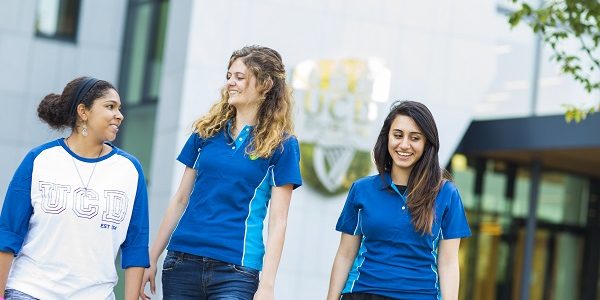Geography
BSc (Hons) (NFQ Level 8) or BA (Hons) (NFQ Level 8)

Course Video
Curricular information is subject to change.
Open AllGeography is the only discipline that combines the study of both the natural and social worlds, and their interaction, and is key to solving global problems such as climate change, poverty, migration, urbanisation and environmental management. Do you want to make sense of this highly complex world and become an informed global citizen? Do you want to learn IT, field and laboratory techniques highly valued by employers such as Geographical Information Systems (GIS)?
By studying Geography in UCD, you will understand the context in which environmental, socio-cultural and politico-economic decision-making takes place and develop skills that prepare you for the workplaces and societies of tomorrow.
First Year
Topics include:
- Geography Matters
- Mapping a Sustainable World
- Dynamic Earth
- People, Places and Regions
- Plus another subject
- Plus Elective module
Second Year
Topics include:
- Introduction to GIS for the Social Sciences
- Making the Irish Landscape
- Field Studies in Ireland
- Global Historical Geographies
- Rivers, Estuaries and Coasts
- Weather, Climate and Climate Change
- Quaternary Environmental Change
- Political Geography
- Cities in a Global World
- Plus another subject
- Plus Elective modules
Third Year
Topics include:
- Social/Population Geography
- Overseas fieldwork
- Environment and Sustainability
- Development of Geographies
- The Quaternary of Ireland
- Global Risks & Resilience
- River Catchment Management
- Far Right, Hate & Political Polarisation
- Plus another subject
- Plus Elective modules
BSc Geography students may apply in their third year to do an internship or study abroad.
Fourth Year
BSc Geography students may choose from a range of specialist topics and undertake intensive research skills, including completing a substantial research project. These include:
- Fortress Europe & the Global War on MigrantsCritical Ideas in Geography
- Planetary Geomorphology
- The Urban Environment
- Historical Geography of Ireland
- Development of Dublin
- US Foreign Policy
- Projects in GIS
- Political Geography
- Research in Action
- Civil Society & NGOs: Theory and Practice to change the world
| Study Geography (BSc Social Sciences) |
|---|
as a Joint Major with one of the subjects below:
OR - with one Minor subject:
OR - within a pathway:
| Studying Geography (BA Joint Honours) |
|---|
as a Joint Major with one of the following:
International opportunities have included exchanges to:
- Cologne, Germany
- Grenoble, France
- Barcelona, Spain
- Stockholm, Sweden
- Pisa, Italy
- Melbourne, Australia
- USA
Our graduates have found employment as:
- GIS specialists working with local government agencies and private industry (e.g. ESRI, ICON).
- Researchers and policy analysts with Teagasc, ESRI, NGOs and governmental departments.
- Planners in both local government and private sector consultancies.
- Educators at primary and second level, as well as in high-profile national and international universities.
- In other varied organisations such as Google, Habitat for Humanity, Deloitte and property consultancies.
Many Geography graduates continue with further study of their discipline or proceed directly to Master’s degrees in social or environmental sciences, law, or business.
“This course is built to ensure that students gain a broad interdisciplinary knowledge of Geography and its core concepts of people, space and place through both an Irish and international lens. With a wide selection of modules available across all areas of Geography, I was able to focus my studies on areas of interest within the discipline such as historical, urban, environmental, and social geography which I found engaging and beneficial in understanding today’s world in a greater context. I also developed useful skills of critical thinking, fieldwork, spatial and data analysis and research skills throughout the course that are greatly transferable into the workplace. An amazing experience, full of critical learning and hands-on experiences.”
Eva Cahalane, Student
UCD School of Geography
Newman,
Belfield,
Dublin 4
Email: geography@ucd.ie


